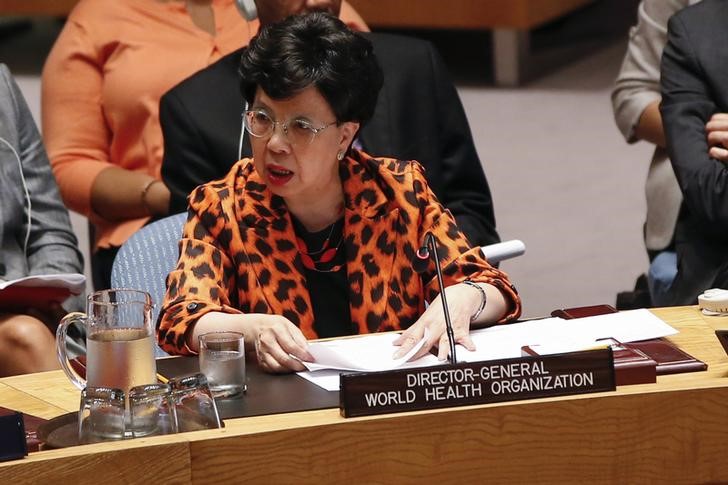By Stephanie Nebehay
GENEVA (Reuters) - The Executive Board of the World Health Organisation (WHO) agreed on Sunday to create a contingency fund and an emergency workforce to respond quickly to crises after strong criticism of the agency's delay in confronting the Ebola epidemic.
Director-general Dr. Margaret Chan acknowledged that the outbreak showed the need to strengthen WHO's crisis management and to streamline procedures for recruiting frontline workers.
"We give member states our commitment to deliver on the action-oriented agenda," Chan said at the end of the board's special session.
In the past year, 21,724 Ebola cases have been reported in nine countries and 8,641 people have died, according to the WHO which says West Africa's outbreak is ebbing.
A resolution seeking the reforms, brought by the United States and South Africa, was adopted by consensus at the 34-member forum.
"The WHO we have is not the WHO we need, not the WHO we needed to respond to health emergencies of the magnitude of Ebola," Tom Frieden, director of the U.S. Centers for Disease Control (CDC), told the talks.
Frieden, referring to the WHO's annual meeting of health ministers in May, added: "We have given some structure to what we expect in May, which is far-reaching reforms."
In the debate, he said that political considerations often overruled technical expertise at the United Nations agency,
Major donors welcomed agreement on the emergency fund, which a WHO committee already recommended in 2011 should contain $100 million after the 2009-2010 influenza pandemic.
Sally Davies, chief UK medical officer, promptly announced a $10 million contribution to the new fund.
"We need to ensure that a clear line of command for all levels of the organisation is in place for emergency operations and we need a global work force ready to be deployed in a effective and timely manner," Dr. Dirk Cuypers of Belgium's health service said on behalf of the European Union.
Malebona P. Matsoso, South Africa's director-general of health, said the accord would "make WHO an even more resilient, responsive, technically capable and well-structured organisation".
The session was called by states seeking reforms amid strong criticism, especially of WHO's Africa regional buro.
Ebola cases are declining in Guinea, Liberia and Sierra Leone, Chan said. "But we must maintain the momentum and guard against complacency and donor fatigue."
Some $4 billion has been spent to try to halt its spread and WHO requires a further $1 billion this year, U.N. special envoy David Nabarro said.

Jerome Oberreit, secretary-general of Medecins Sans Frontieres International said: "Thousands have died because of international negligence. It has become alarmingly evident that there is no functioning global response mechanism to a potential pandemic in countries with fragile health systems."